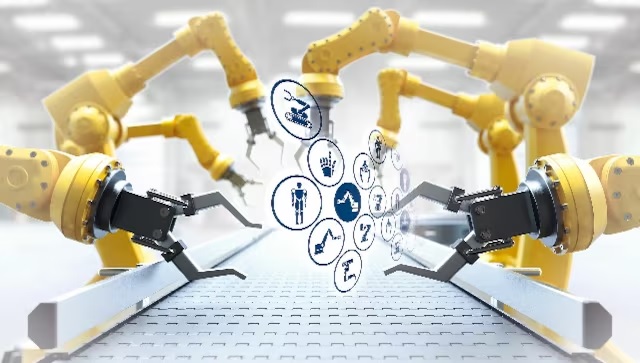India and UAE’s synergy in the field of technology, AI, robotics and manufacturing is mind-boggling. Both countries are well poised to work as brothers and friends, on equal terms.
If we were to look at the information screens at departures at any major Indian airport, we are likely to see a familiar pattern: Dubai, Abu Dhabi and Sharjah appear repeatedly on the flickering displays.
Many Indians have started using Dubai, Abu Dhabi or Sharjah airports, to connect via the UAE to flights bound for Europe, North America, Africa or elsewhere in Asia. Now that the UAE has become India’s gateway to the world, the two countries are also developing a strategic alliance that could reshape geopolitics across South Asia and the Middle East.
Relations between India and the UAE are on the rise in recent years. A lot has to do with the efforts of Indian Prime Minister Narendra Modi, the rulers of UAE and their respective and very capable core teams.
The UAE is home to one of the largest groups of Indians. For decades, many Indians have remained in the UAE and have forged strong cultural and family ties to the area.
According to figures from Central Bank of the UAE, annual remittances sent home by Indians in the UAE top the list of non-resident remittances to India. Indian FDI into UAE, and UAE FDI into India is significantly on the rise in recent years.
Dubai, which is UAE’s most populous city, is now an international trade and business hub and has already positioned itself to be among the best globally. Dubai has decided to have its economy organized around four pillars: trade, transport, tourism, and technology.
Software, business and professional services and education have recently been the top sectors for India-based investment going into the UAE.
The UAE and India’s mutual appreciation for society is set to get stronger in the coming years. In February 2022, the UAE-India comprehensive economic partnership agreement (CEPA) was signed and officially entered into force three months later. The agreement was the first of its kind signed by India in the Middle East and North Africa region, and the first for the UAE with any country globally.
India has also agreed, for the first time, to set up an Indian Institute of Technology in the UAE.
Robotics has successfully taken over the global tech market by storm with automation and artificial intelligence. There is already an AI race at an international level. There is a robot race where different countries compete with each other with government funds and tech companies.
It is in this area where India and UAE look like ideal complementing partners who can mutually leapfrog into the fourth pillar of the economy – technology. All the possible synergies in this friendship and partnership match up.
According to a study done by Oracle, the UAE, India and China are taking a rapid lead in the global adoption of robotics
UAE is already using robots extensively in hospitals, for surgeries, in pharmacies, in banks, for public services such as police, on beaches, to make car licence plates, to clean metro stations and many other activities.
India, on the other hand, is well-known for its academic programs that are focused on technology. Focusing on robotics as a discipline, India has become a great place for robotics studies, technology, research & development, and prospective applications. India also has tremendous potential to implement robotics in the manufacturing sector.
With initiatives such as Make in India, robotics as a prominent player continues to draw global investments to India, transforming it into a genuine pillar of robotics expertise.
On their part, the governments of both India and the UAE are doing their share of easing the path to speed up the acceleration of the fourth industrial revolution in this region. The government-private-public partnership would need to rise to the occasion to look at more medium to long-term strategies which could focus, among other areas, in the field of robotics.
The UAE already has a national strategy for artificial intelligence 2031, with a very capable young minister handling this portfolio. Dubai, on its part, has launched The Dubai Robotics and Automation Program, which was launched recently by the Crown Prince of Dubai, Sheikh Hamdan bin Mohammed. The Crown Prince also called on various government entities and the private sector to strengthen cooperation with local and international research and academic institutions to develop a regulatory and legal environment that supports the growth of the robotics and automation sector.
India and its government and private sector can play a major role by setting up entities which can assist in training, grooming and mentoring the young emiratis to scale up rapidly in this area. People who have lived in this region are well aware of how intelligent, capable and tech-savvy the younger generation of emiratis are. Over time, they would become a force to reckon with. If large Indian private sector firms and groups who are based in the UAE create forward-thinking programs which help both nations, the benefits could be huge and far-reaching for the people of both nations.
If specially designed programs of international standards are created by Indian institutes, both in India as well as in UAE, specifically to speed up Artificial Intelligence and Robotics, the multiplier effect could be huge.
While the pillars of trade, transport and tourism would continue to get focused upon and grow, the India-UAE synergies in the field of technology, AI, robotics and manufacturing are mind-boggling. Both countries are well poised to work as brothers and friends, on equal terms.
India should recognize the fact that, in the future, among its hub cities, some could be outside India. UAE is certainly encouraging that.
And within India, it should reciprocate the same for the UAE.

